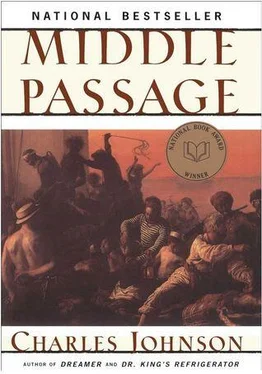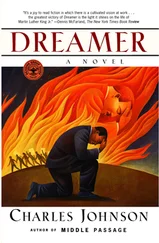Charles Johnson - Middle Passage
Здесь есть возможность читать онлайн «Charles Johnson - Middle Passage» весь текст электронной книги совершенно бесплатно (целиком полную версию без сокращений). В некоторых случаях можно слушать аудио, скачать через торрент в формате fb2 и присутствует краткое содержание. Год выпуска: 2012, Издательство: Scribner, Жанр: Современная проза, на английском языке. Описание произведения, (предисловие) а так же отзывы посетителей доступны на портале библиотеки ЛибКат.
- Название:Middle Passage
- Автор:
- Издательство:Scribner
- Жанр:
- Год:2012
- ISBN:нет данных
- Рейтинг книги:5 / 5. Голосов: 1
-
Избранное:Добавить в избранное
- Отзывы:
-
Ваша оценка:
- 100
- 1
- 2
- 3
- 4
- 5
Middle Passage: краткое содержание, описание и аннотация
Предлагаем к чтению аннотацию, описание, краткое содержание или предисловие (зависит от того, что написал сам автор книги «Middle Passage»). Если вы не нашли необходимую информацию о книге — напишите в комментариях, мы постараемся отыскать её.
a slave ship en route to collect members of a legendary African tribe, the Allmuseri. Thus begins a daring voyage of horror and self-discovery.
Peopled with vivid and unforgettable characters, nimble in its interplay of comedy and serious ideas, this dazzling modern classic is a perfect blend of the picaresque tale, historical romance, sea yarn, slave narrative, and philosophical novel.
Middle Passage — читать онлайн бесплатно полную книгу (весь текст) целиком
Ниже представлен текст книги, разбитый по страницам. Система сохранения места последней прочитанной страницы, позволяет с удобством читать онлайн бесплатно книгу «Middle Passage», без необходимости каждый раз заново искать на чём Вы остановились. Поставьте закладку, и сможете в любой момент перейти на страницу, на которой закончили чтение.
Интервал:
Закладка:
“And the other two-thirds?”
“Elihu Griswold, a Georgia planter, owns a big slice, but I don’t expect you’d recognize these names. Like I said, these blokes don’t like to be seen. For good reason too, given all the crimes they’ve committed. The last one is a Creole speculator named Philippe Zeringue.”
“Ngonyama won’t listen to any of this, Captain. There are fifteen Africans now, but only four Yanks. They have the arms and we do not, nor any chance for regaining our course if you— Philippe Zeringue, did you say?”
“You know him?”
“No, but — uh, I believe I’ve heard the name.”
“Well, three of these rebellious Allmuseri are his ”
“Which three?”
The Old Man shrugged off my question, talking on about an invisible economic realm — a plane as distant from me as the realms of religion and physics — behind the sensuous one I saw. Suddenly the ship felt insubstantial: a pawn in a larger game of property so vast it trivialized our struggles on board. My months on the Republic seemed to dissolve, delivering me back to Papa Zeringue’s smoky restaurant, which I’d never left, and then it was he talking in front of me and not Falcon, laughing at my Illinois country-boy ignorance of how the world worked, telling me there was no escape from the webs he had woven in New Orleans, across the sea, and even into the remotest villages of Africa. But how could he do this, I wondered? Buy and sell slaves when he himself was black? Was this not the greatest betrayal of all?
“Of all what?” asked Falcon.
I’d spoken in my reverie without knowing it. “Nothing,” says I. “Captain, I think I’d better go to my bunk and lie down. But you must promise to do as the Allmuseri say. Our lives depend on it.”
“I’ll tell ’em what I told you. But first I must ask you for one last favor. Have you the gun-ring I gave you at the fort?”
I held up my left hand.
“Give it to me, please.”
He waited, pensive, staring past me to Nacta’s back in the doorway, his features like fog, remembering his nightmarish dream of things to come. I could not tell whether he accepted the Africans’ conditions or if he was hatching some new treachery and, frankly, after learning that Papa was my real boss, that his reach extended this far, that I still had to answer to him, I felt too defeated to say more. I handed over the ring. He shipped a face suddenly full of scorn, one that told me Get Out. I did, glancing at the brand on Nacta’s shoulder, then at the others as I went, perplexed and perversely fascinated by which of the blacks belonged to a black. Making my way aft, I saw Ngonyama and Diamelo enter the captain’s room. Part of me knew Falcon was sifting through the wreckage for a weapon. I knew if he found one he would shoot them, but I thought this possibility slim until, as Cringle leaned over the rail near me, his Protestant stomach perpetually knotted and belly full of wind from Squibb’s baking, we heard a single shot like the crack of doom on Judgment Day. I felt that shot in every fiber. My scalp began to crawl. The mate spun on his heels and sprang in four steps to Falcon’s door. Nacta pushed him back. Then I couldn’t see clearly as the other Africans clewed up at the entrance. Someone, Akim said, was dead. I clawed through the crunch of bodies, hoping it was not Ngonyama, that Falcon, in his stupidity, had shot Diamelo instead. Inside the room I was restrained by Ghofan. He held me with both hands. Said, “This one gave him the gun.” He was shouting at Ngonyama, who made answer that “Rutherford came in unarmed. Let him go.”
Released, I stumbled forward and found myself beside Diamelo. He was peering down at Captain Falcon, whose ringed hand, his right, was tight on the trigger of a Philadelphia derringer that had blasted away half his head, painting the wall behind him pink with kernels of bloody scalp big as peppercorns, a pâté of brains and blood, and left us — as all in the suddenly silent room knew — alone and sightless on strange waters, our chances for reaching home and dropping hook dashed by his death like driftwood.
As runaway slaves follow the North Star, having no guide to their homeland but a single light overhead, so the Republic steered by the stars for a fortnight. No matter, as Cringle told me, that the source of this fire in the heavens had likely died a millennium before the earth cooled, or that all our dreams were pinned upon an illusion of light, a trick of perception: we sailed on. And on, the clipper now a crippled Ark of blacks bandaged in canvas, begging for attention, calling night and day for food, medicine, and consolation. Petty fights and rumors broke out like disease itself, causing divisions we did not need, for our first priority was getting the ship into trim. If decks did not need scrubbing, then headstays needed tarring; if not that, then slack-standing rigging had to be overhauled, replaced, and repaired, for you cannot touch a single rope without altering the intricate tracery of the whole design. Poor old ship! She was not worth a powder shot now. At times, late at night on calm waters, I almost thought I heard her weeping for herself and our pitiful skeleton crew of half-starved ex-slaves. Without much water, without good canvas, and almost without an experienced crew, we were buffeted about by contrary winds, thrown off course frequently, so that often we flew in circles, retracing our path, or fell into a trance of sea and wind too frail to propel us, drifting aimlessly like men lost in the desert, our sails mere rags and ropes in ill repair.
Oddly enough, Diamelo spun leeward and suffered the greatest loss when the Old Man’s body, weighted and bundled in sailcloth, was brought on deck and pitched into the Ditch. He watched nervously as Cringle and I cracked open the skipper’s sea chest and distributed his gear before the mast among the slaves to lighten ship, and because it just made your duties too damned hard to have reminders of a dead shipmate sculling underfoot. But Diamelo wanted these reminders. All along I had tried to steer small when near him and not cross his bows, because he never spoke to the Americans except through a third person. Whenever he had to hand anything to Cringle or Squibb, he threw or slid it toward them with his toe. Deeply, deeply he hated us. Daily he led a whispering campaign against Ngonyama, accusing him of treason against his own people by serving as Falcon’s liaison to the slaves. I said that wasn’t so. He called me a Cooked Barbarian and told me if I spoke out of turn again I would be thrown in irons. Physically he was thin as a drainpipe, so lubberly I could have taken him down in two, maybe three seconds. Weeks below had left him bony, with large, froglike eyes that fastened onto you like fingers; swollen feet; and a tight skullcap of crinkly hair that could easily double under the boiling African sun as a natural pith-helmet. So it was not so much his stature that sometimes swayed and stoked up the others when he spoke as the purity of his racial outrage. This he kept close to him like a possession — imagine how one holds a cat — a point of reference that made every event prior to his enslavement pale by comparison. After hearing him plead earlier for our heads, it was easy to see his bondage in the barracoon, then in the ship’s hold, as the most significant, the most memorable, even the finest hour of his life, a memory to safeguard and strengthen, to designate as the anno Domini demarcation since his birth two decades before. Prior to his imprisonment, said Ngonyama (who knew him since childhood), Diamelo had been a soger who drank palm wine and drifted indifferently from one occupation to another; been the village wastrel; the first at every dance, the last to leave; the boy who peeped at women when they went off to pee; the bully who proved himself on smaller boys; the hunter who hung back until the prey was dead or declawed; the sleepy student bored by muscle-banging field work, contemptuous of the doddering elders, impatient with the painstaking years required to master one of the complex Allmuseri crafts. But there in the crowded barracoon Diamelo found his long-delayed focus: Ebenezer Falcon, a true (godsent) devil to despise. A dragon so exquisite in his evil that Diamelo, never a boy to impress his people by his skills or social contributions, discovered no one spoke of his flaws and personal failings when all their lives were wreckage. He had but to breathe one two-syllabled iambic word, Falcon, to hold their ear and magically control their emotions. If the Old Man had thrown Ngonyama’s sense of direction into doubt, he had inadvertently handed Diamelo’s to him on a plate. In three weeks the wastrel previously cool toward his tribe’s culture became its champion, a change the older Allmuseri, like Ngonyama, found unconvincing, opportunistic at times, even false, though none could afford to criticize him during their crisis below. But a champion must keep his dragon alive. It must not disappear, as the skipper did when he slipped his cables. Nay, retired dragon-slayers tended to be as directionless as soldiers after a war.
Читать дальшеИнтервал:
Закладка:
Похожие книги на «Middle Passage»
Представляем Вашему вниманию похожие книги на «Middle Passage» списком для выбора. Мы отобрали схожую по названию и смыслу литературу в надежде предоставить читателям больше вариантов отыскать новые, интересные, ещё непрочитанные произведения.
Обсуждение, отзывы о книге «Middle Passage» и просто собственные мнения читателей. Оставьте ваши комментарии, напишите, что Вы думаете о произведении, его смысле или главных героях. Укажите что конкретно понравилось, а что нет, и почему Вы так считаете.












